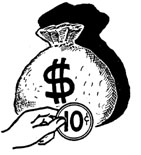
The “Stumbling and Tripping” of Executive Pay
STOCK PRICES & DISCONNECTED CAPITAL
The stumbling and tripping of excessive compensation packages of managers is a hard topic to write about since the stumbling of excessive executive salaries is not as apparent as the pinch of sub-living wages. When executives earn multi-million-dollar salaries, they simply have more resources to disguise their staggering walk. Also, while sub-living wages universally lead to pinching and galling, not all large salaries lead to stumbling and tripping.
There is a terrific temptation to moralize about executive pay. Some people want to exonerate executives who are paid fantastic salaries by emphasizing the heroic sacrifices they make for their organizations. Others want to vilify executives for the dripping greed of their hand-picked board of directors who craft such lucrative compensation plans. What is often behind such diametrically opposed moralisms is a conflict over whether executives are “worth” their pay. The executive salary surveys found in Business Week, The Wall Street Journal, Forbes, and others give rise to either moral indignation or affirmation, the issue being whether or not stockholder value has increased proportionate to the rise of executive salaries.
My argument is that the “worth” argument is misguided because it misses a fundamental insight offered by the Catholic social tradition on compensation, namely that pay, even executive pay, can never equitably compensate labor. Work is always more valuable than its economic output or instrumental or stockholder value precisely because work is a creative endeavor that emulates and enhances God’s creation. If we talk as though pay can be equated to human labor, we will never probe the deeper structural and spiritual dimensions that underlie the tripping and stumbling of executive pay.
You May Also Enjoy
The FIRE strategy -- which stands for financial independence, retire early -- doesn’t alter the debt-peonage economy; it just carves out exceptions for a select few.
A report by the U.S. Congressional Budget Office stated that legalization of same-sex marriage in all fifty states would generate a huge tax windfall.
Socrates asks what would happen to a capitalist nation if everyone practiced the greedlessness of Jesus, or Buddha, or even Thoreau?

